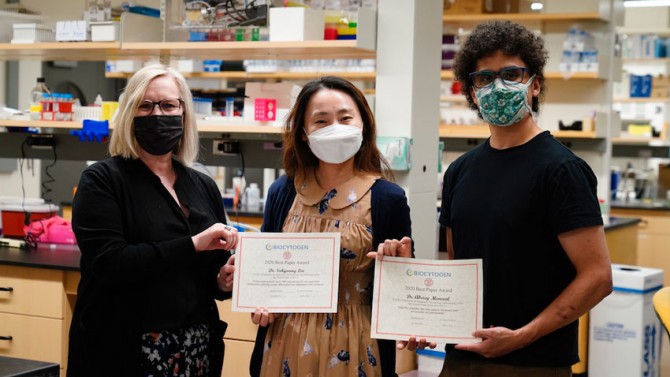News directly from Cornell's colleges and centers
Award commends typhoid toxin and potential peptide therapy research
By Melanie Greaver Cordova
Graduate students and postdoctoral researchers in the Department of Microbiology and Immunology faced stiff competition for this year’s Biocytogen Best Research Paper Award. Their work in infectious disease and host immune responses has been recognized in peer-reviewed journals, and faculty members faced the difficult task of selecting the winning entries. First- and second-place winners of this year’s award are Drs. Sohyoung Lee and Abrrey Monreal, respectively.
“Our researchers conducted truly outstanding work. I have been impressed with the dedication to research shown by all our trainees during difficult personal and professional times throughout the pandemic,” said Dr. Deb Fowell, department chair and co-director of the Friedman Center for Nutrition and Inflammation.
This annual award acknowledges excellent graduate student and postdoctoral research published in the preceding calendar year. It is sponsored by a grant awarded to the department, which is housed in the College of Veterinary Medicine, from Biocytogen, a biotechnology company that offers gene-targeted animal models and other services to the research community. “It has been an honor to partner with Biocytogen. Their commitment to the support of young scientists and innovative basic science is to be commended, and much appreciated,” said Fowell. The winner and runner-up receive travel support to attend a scientific meeting of their choice.
This year’s top prize went to Lee, a postdoctoral researcher in the lab of Dr. Jeongmin Song, for “Salmonella Typhoid Toxin PltB Subunit and Its Non-typhoidal Salmonella Ortholog Confer Differential Host Adaptation and Virulence.” The paper, published in Cell Host and Microbe, offers insight into the host adaptation of Salmonella A2B5 toxins, as well as the design for improved typhoid fever vaccines and therapeutics.
“Even though S. Typhi is one of the earliest recognized pathogens in human history, its infection remains a major public health concern because of the global spread of multidrug-resistant and extensively drug-resistant strains,” said Lee. Currently, Lee is studying another pathogenic mechanism of typhoid toxin, and is still determining which conference she’d like to attend using the award.
Monreal, a postdoctoral associate in the lab of Dr. Hector Aguilar-Carreno, earned second place for his paper “SialoPen Peptides are New Cationic Foldamers with Remarkable Cell Permeability,” which published in Heliyon. Said Monreal, “This research was the first report on an unnatural helical cell-penetrating peptide using a Sialic acid derivative for potential use to deliver therapeutics intracellularly.” The next step is to test these compounds for their effectiveness in delivering cancer drugs and protective proteins. Monreal hopes to attend a national virology conference in 2022.
Said Fowell, “The quality of these publications by Drs. Lee and Monreal, and the excellence in entries we saw across the board, leaves us with much to be excited about for the future of microbiology and immunology research.”
The full version of this story is available on the College of Veterinary Medicine news page.
Melanie Greaver Cordova is assistant director of communications at the College of Veterinary Medicine.
Media Contact
Get Cornell news delivered right to your inbox.
Subscribe

